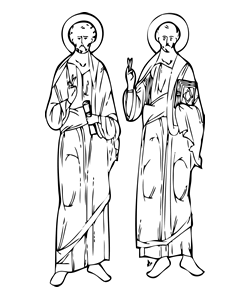|
|||
|---|---|---|---|
| This weekly bulletin insert complements the curriculum published by the Department of Christian Education of the Orthodox Church in America. This and many other Christian Education resources are available at http://dce.oca.org. | |||

The tenth chapter of the Book of Acts tells of changes and growth in the early Church. As people with varied backgrounds joined the Church, those who were already members had to find ways of worshipping in harmony with these newcomers. Sometimes their ideas of what God wanted from them also had to change, as the apostle Peter would learn. The tenth chapter begins with Peter's vision of a large sheet being lowered by its four corners from heaven. Animals, some considered unclean in Jewish law, are contained in the sheet: "all kinds of four-footed creatures and reptiles and birds of the air." A voice telling Peter to "kill and eat" is followed by his protest that he has never eaten anything profane or unclean. But when the voice tells him that he must not call profane anything that God has made clean, Peter begins to realize that his understanding of God's will needs to change. He will soon say, "I truly understand that God shows no partiality." So he preaches the Gospel to the Gentiles, people who were not raised as he was in the Jewish law. Then comes another attitude-changing event: the Holy Spirit falls upon those listening to Peter. And "the circumcised believers who had come with Peter were astounded that the gift of the Holy Spirit had been poured out even on the Gentiles, for they heard them speaking in tongues and extolling God." The faithful believers of Jewish background are shown that God's grace is for others as well as themselves. It isn't an easy fact for them to take in. The first verses of the eleventh chapter of Acts describe the reaction of the apostles and believers in Judea, hearing of the Gentiles' acceptance of God's word. They criticize Peter: "Why did you go to uncircumcised men and eat with them?" The Church would face similar challenges many times again. In the third century, for example, the question arose of what to do with those who had "lapsed" during the persecutions in the Roman Empire. How were they to be received back into the Church, if they were received at all? Many Christians at that time had lost eyes, limbs and health because they refused to deny their faith. How would they live in harmony with those who had escaped persecution by recanting? So serious was this question that Church leaders devised three categories of the lapsed: those who had actually sacrificed to the pagan gods, those who had offered incense, and those who had purchased certificates stating that they had complied with the Empire's demands. The penances were different for each group. The present world confronts Orthodox Christians with the challenge to love each person while firmly upholding Church teachings that many persons have abandoned. It is no easy task, and the only way to do it is to cling to the assurance, in John 16:33 that Christ gives us: " Be of good cheer, for I have overcome the world." |
|||
